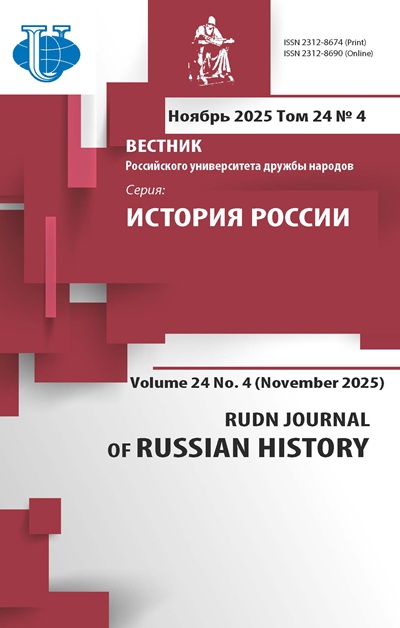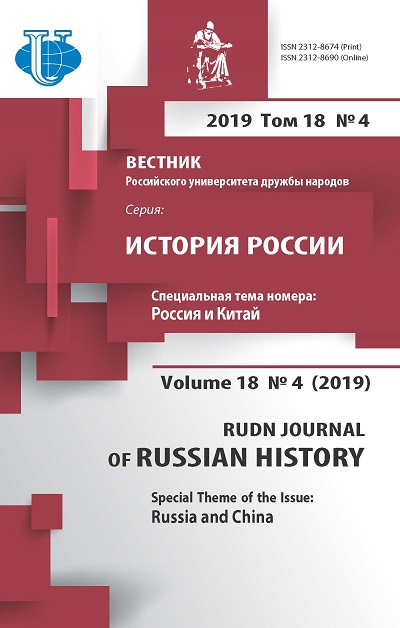The Harbin Polytechnic Institute as a center of Russian science and education in China (1920-1950s)
- Authors: Bocharova Z.S.1, Krotova M.V.2
-
Affiliations:
- Lomonosov Moscow State University
- Saint-Petersburg State University of Economics
- Issue: Vol 18, No 4 (2019): RUSSIA AND CHINA
- Pages: 779-803
- Section: RUSSIA AND CHINA
- URL: https://journals.rudn.ru/russian-history/article/view/22307
- DOI: https://doi.org/10.22363/2312-8674-2019-18-4-779-803
- ID: 22307
Cite item
Full text / tables, figures
Abstract
This article analyzes the activities of the largest university in China in the 1920 to 1940s - the Harbin Polytechnic Institute (HPI), established by Russian emigrants to maintain the Chinese Eastern railway (CER). The fates of CER and HPI were closely associated. The establishment of the Institute was initiated and supported by the railway administration, which provided a building in Harbin and offered substantial funds for the maintenance of HPI. In turn, the Institute trained personnel for the railways and construction projects in Manchuria. The article places the history of the Institute in the context of the history of Manchuria and Russian-Chinese relations. Over its history of nearly one hundred years the Institute repeatedly changed its name. The turns in the political situation in China also led to changes in the governing structure of the Institute, in its educational activities and its teaching personnel. The present research builds on a broad historiographical and source base, including memories of graduates of the Institute, items from the Harbin press, and unpublished archival documents. Documents of the Board of CER, reports, personal files of teachers shed light on issues including the Institute’s corporate academic culture, its student composition, the organization of the educational process, and its sources of funding, as well as the USSR’s pragmatic approach towards the Institute. Established in 1920, the Institute survived several crises. The present case study reveals the role of higher education in strengthening Russian-Chinese relations and cultural diversity of China. In conclusion, the HPI made an important contribution to the preservation of national identity among the Russian youth in China and supported their adaptation. At the same time, it is fair to say that the Institute, and hence Russian emigrés, made a significant contribution to the establishment of a system of higher education in China.
About the authors
Zoya S. Bocharova
Lomonosov Moscow State University
Author for correspondence.
Email: kpzg@mail.ru
Doktor istoricheskikh nauk [Dr. habil. hist.], Professor at the UNESCO Chair for the Study of Global Problems, Lomonosov Moscow State University
1, Leninsky mountains, GSP-1, Moscow, 119991, RussiaMaria V. Krotova
Saint-Petersburg State University of Economics
Email: mary_krot@mail.ru
Doktor istoricheskikh nauk [Dr. habil. hist.], Professor at the Department of International Relations, Medialogy, Political Science, St. Petersburg State University of Economics.
21, Sadovaya St., St. Petersburg, 191023, RussiaReferences
- Avtonomov, N.P. “Vysshaya shkola v Kharbine. K istorii yeye vozniknoveniya.” Kharbinskiye kommercheskiye uchilishcha KVZHD, no. 7 (1960): 26–33 (in Russian).
- Anchugova, N.A. “O transportno-ekonomicheskom fakul’tete KHPI.” Russkaya Atlantida, no. 35 (2009): 31–35 (in Russian).
- Bakich, O. “Russkoye obrazovaniye v Kharbine: 1898–1962.” In Zapiski russkoy akademicheskoy gruppy v SSHA, 269–294. New York: [N.s.], 1994 (in Russian).
- Bakich, O. Harbin Russian Imprints: Bibliography as history, 1898–1961: materials for a definitive bibliography. New York; Paris: Norman Ross Publ., 2002.
- Blaine, R. Administering the Colonizer: Manchuria’s Russians under Chinese Rule, 1918–29. Vancouver, Toronto: UBCPress Publ., 2010.
- Gintse, M.M. “Vospominaniya o KHPI (1948–1952).” Russkaya Atlantida, no. 10 (2003): 37–46 (in Russian).
- Gruner, F., and Ben-Canaan, D. Entangled Histories: The Transcultural Past of Northeast China. Cham, Heidelberg, New York: Springer publisher Publ., 2014.
- Gruner, F. “Russians in Manchuria: From Imperial to National Identity in Colonial and Semi-Colonial Space.” In Crossing Boundaries: Ethnicity, Race and National Belonginess in a Transnational World, 183–205. Lanham: Lexington books Publ., 2013.
- Kanevskaya, G.I. “Russkiy Kharbinskiy politekhnicheskiy institut i sud’ba yego vypusknikov.” Vestnik of the Far East Branch of the Russian Academy of Sciences, no. 2 (2010): 25–33 (in Russian).
- Kanevskaya, G.I. “Kharbinskiy politekhnicheskiy v vospominaniyakh yego vypusknikov.” Rubezh: Tikhookeanskiy al’manakh Vladivostok, no. 3 (865) (1998): 309–316 (in Russian).
- Korenev, B.N. “Politekhnik.” Ob”yedineniye inzhenerov, okonchivshikh Kharbinskiy politekhnicheskiy institute, no. 10 (1979): 5–12 (in Russian).
- Kitunin, A.A. Razvitiye vysokoskorostnogo zheleznodorozhnogo dvizheniya v KNR (XX−XXI vv.). St. Petersburg: RGPU im. A.I. Gertsena Publ., 2019 (in Russian).
- Khisamutdinov, A.A. “Russkoye vyssheye obrazovaniye v Kitaye.” Educational Studies, no. 4 (2015): 274–291 (in Russian).
- Khisamutdinov, A.A. “Russkiy yuridicheskiy fakul’tet v Kharbine.” Law and Education, no. 3 (2016): 105–113 (in Russian).
- Khisamutdinova, N.V. “Russkaya inzhenernaya shkola v Kitaye.” Professional Education in Russia and Abroad, no. 4 (24) (2016): 204–212 (in Russian).
- Lazareva, S.I., and Shpilova, A.N. “Russkiye shkoly i vuzy v Man’chzhurii 20–30-ye gg. XX v.” Russia and the Pacific, no. 4 (2011): 10–20 (in Russian).
- Markizov, L.P. “Institut Sv. Vladimira i Politekhnicheskiy v 1934–1938 gg.” In Gody. Lyudi. Sud’by. Istoriya rossiyskoy emigratsii v Kitaye: materialy mezhdunar. nauch. konf., posvyashch. 100-letiyu g. Kharbina i KVZHD (Moskva, 19–21 maya 1998 g.), 43–45. Moscow: IRI RAN Publ., 1998 (in Russian).
- Matsuzato, K. Russia and Its Northeast Asian Neighbors: China, Japan, and Korea, 1858–1945. Lanham, MD: Lexington Books, 2017.
- Melikhov, G.V. Rossiyskaya emigratsiya v mezhdunarodnykh otnosheniyakh na Dal’nem Vostoke (1925–1932). Moscow: Russkiy put’ Publ.; Vikmo-M Publ., 2007 (in Russian).
- Meshcheryakov, A.Yu., and Antropov, O.K. “Kharbinskiy politekhnicheskiy institut v 1920–1976 gg.” Manuskript, no. 6 (2019): 68–72 (in Russian).
- Obukhov, N.M. Izvestiya i trudy Russko-kitayskogo politekhnicheskogo instituta. Kharbin: Russian-Chinese Political Institute Publ., 1923–1934 (in Russian).
- Ornatskaya, T.A. “Deyatel’nost’ yuridicheskogo fakul’teta v Kharbine v 1920–1937 gg.” Law and Education, no. 4 (2016): 148–156 (in Russian).
- Ratmanov, P.E. “Vysshaya russkaya meditsinskaya shkola v Kharbine (1921–1925 gg.).” Far East Medical Journal, no. 2 (2008): 125–127 (in Russian).
- Shmatov, Ye. “Shkola truda.” Politekhnik. Kharbin (March 25, 1929).
- Verizhskaya, T.P. “Sud’ba moya – vostochnyy fakul’tet.” Russkaya Atlantida, no. 7 (2001): 39–42 (in Russian).
- Vinocuroff, V., and Kamensky, Yu. Russian engineers in Australia. Melbourne: Univ. of Melbourne Publ., 1996.
- Zubareva, L. “Vospominaniya o KHPI.” Na sopkakh Man’chzhurii. Novosibirskoye otdeleniye assotsiatsii «Kharbin», no. 11 (1994): 3–12 (in Russian).
Supplementary files















